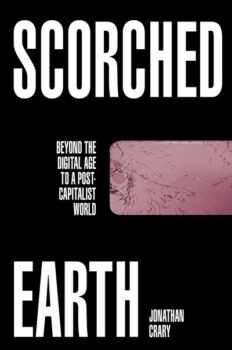At this point, it is a commonplace that the techno-optimist promises of the Internet’s early proponents were either naïve or lies.

Scorched Earth: Beyond the Digital Age to a Post-Capitalist World
Jonathan Crary
Verso, 2022
Claims of the system’s power to connect far-flung individuals and enrich one’s social life are risible. In the West, at least, the Internet’s primary effect has been to dissipate social energies into simulated flickers of friendship, comradery, or antagonism that more often than not ripple into nothingness before any deeper human experience can take root, rendering a large chunk of one’s time and attention pointless beyond the fact that it can be monetized to the benefit of seemingly omnipresent tech companies.
Additionally, the future of “frictionless” consumption promised by an incipient class of tech barons proved to be a new stage in the discipling of productive labour, primarily in the Global South, and the submersion of consumers, mostly in the North, into networks of technological production that rely on out-of-sight-out-of-mind dispossession, mineral extraction, and assembly.
The notion that the Internet represented a supposed democratization of power and influence, one that could generate an anti-systemic, anti-authoritarian movement against state domination, also proved delusional, as the system’s privatization led corporations to devise new methods of time and value appropriation for the digital space.
Of course, it should be noted that even during the Internet’s earliest and supposedly most auspicious days, this democratization was never a possibility. As Yasha Levine outlines in his 2018 book Surveillance Valley: The Secret Military History of the Internet, the Internet and personal computing technology were developed during the Cold War as counterinsurgency tools by the U.S. military-industrial complex, and even after their privatization, their capacity for surveillance and data collection has been utilized by states against their own populations (as the NSA leaks of 2013 verified).
In his new book, Scorched Earth: Beyond the Digital Age to a Post-Capitalist World, Jonathan Crary declares: “If there is to be a livable and shared future on our planet, it will be a future offline… If we’re fortunate, a short-lived digital age will [be] overtaken by a hybrid material culture based on both old and new ways of living and subsisting cooperatively.” This new culture, Crary proposes, must include “the expansion of local food production and distribution, the making available of basic health care and paramedical services, the protection of water supplies, and the equitable remaking of existing housing stocks.” This is a future that must be extricated as much as possible from the atomizing, monetizing, anti-communitarian and pro-neoliberal logic of what he dubs the “internet complex.”
Crary argues that the Internet as it developed—or, more accurately, as it was always going to develop given its origins—has reified new patterns of value extraction by the ruling classes in Western countries upon the productive populations of the world, a deeply racialized and sexualized domination that disproportionately impacts those in the Global South.
For most of its users, meanwhile, Crary argues that “the internet complex is the implacable engine of addiction, loneliness, false hopes, cruelty, psychosis, indebtedness, squandered life, the corrosion of memory, and social disintegration,” an imposed reality that inculcates a kind of digital realism akin to a “passive acceptance of numbing online routines as synonymous with living.”
Meanwhile, for those whose lands, resources, and traditional ways of living stand in the way of the material extraction required to maintain the internet complex, the “frictionless” reality of technologized, globalized capitalism often takes the form of military and police encroachment, criminalization, dispossession, and even murder. Crary writes:
Violence to both people and their lands defines [the internet complex’s] imperial and neocolonial operations, as it has for several centuries. The very possibility of a ‘digital age’ requires the expansion of these destructive industrial practices to world-vanquishing extremes.

The NSA’s National Security Operations Center in 2012. (Photo: Wikimedia Commons)
In Crary’s argument, dispossession defines the workings of the internet complex globally and within the imperial core. On one level, this means the expropriation of lands for the construction of mines, assembly plants, and unsustainable data centres that require millions of gallons of water per day to cool. On another, it means the dispossession of people of their productive time, either through forcing them into exploitative production relationships or infusing tech platforms like social media with increasingly addictive qualities to increase the hours that consumers waste on digital products.
On still another level, it means the active dispossession of individuals of their eyes, faces, and voices through the collection of biometric data meant to “optimize” user experience through the gathering of facial and vocal data, the analysis of this data by company software, and the implementation of changes to increase “eye-catching” features, “smile time,” and above all, monetizable hours.
“High-tech corporations model their ambitions around an ‘attention economy’ in which financial success requires soliciting the greatest number of ‘eyeballs,’” Crary explains.
Just as time-motion studies and scientific management techniques sought to make efficient the motions and work of the body during a key phase of industrial capitalism, now scrutiny of the eye [and face and voice] serves the goal of managing an observer… and training [them] to be an accessory of information processing… But spying on individuals and their personal proclivities is not one of its main objectives. A more important goal is the discovery of large-scale regularities among targeted demographics, with the aim of financializing the harvested information [that] provides analytics needed by designers for steering sight into appropriately attentive behaviors.
He concludes that our main concern with the collection of biometric data and its monetization “should be that we are all increasingly inhabiting and interacting with online worlds fabricated to effect predetermined, routinized visual [and emotional] responses.” This interaction constitutes “a contemporary mode of informal work that produces value as marketable information for corporate and institutional interests.”
Crary’s overarching argument is that the internet complex is undergirded by a globe-spanning system of social, economic, and political organization that he labels “scorched earth capitalism”—essentially the neoliberal, technoscientific model exported around the world during the “globalization” era of the late twentieth and early twenty-first centuries. His analysis incorporates both the micro (impacts of tech overuse on Gen Z) and macro (the Enlightenment turn to the objectification of the natural world) to argue that scorched earth capitalism is antithetical to cultures of commonality, ecological harmony, and equitability between peoples.
In his book, Crary convincingly outlines that the globalization of scorched earth capitalism has defaced the world and its inhabitants on a massive scale. It has sought to impose a 24/7 model of value extraction on consumers to monopolize and monetize their attention spans. It has demeaned the social lives of young people in the Global North and subjected the youth of Southern countries to “austerity, indebtedness, famine, and state terror.” It has undermined the possibility of meaningful grassroots political organization. It has attacked the longevity of local and regional forms of sociality, production, and consumption while feeding the life extension fantasies of tech oligarchs who have tried to globalize their cold, spiritless vision of the future. Meanwhile, it continues to justify itself with long-discredited myths about the liberatory nature of platforms and systems whose primary function is value extraction, social division, and the perpetuation of global inequality.
In ‘scorched earth capitalism’ and its specific extensions into the realms of information processing, globalized food production, militarization, and more, Crary sees a system bent on the homogenization of deeply varied peoples, cultures, and ways of organizing economic and political life. The purpose of this homogenization is to impose uniform models of production and consumption on the world—models based on digitization, heavy industrialism, unequal exchange, and the offloading of ecological consequences onto the South—to allow more efficient upward transfers of wealth to a transnational oligarchy mainly based in Western countries.
Crary’s solution is common sense but, in the digitized funhouse of scorched earth capitalist discourse, uncommonly radical. His suggestions revolve around recognizing the materiality and sensuousness of the human body and pursuing activities that deepen one’s awareness of this materiality, the materiality of others, and the communal nature of the senses and intellect.
One of the central concepts he includes is that of the “encounter,” borrowed from Zapatista political philosophy and Guy Debord’s Society of the Spectacle. The encounter, Crary writes, is both a sensuous experience of sociality and nature and a political project based around community meetings and workers’ councils. The theme that unites these concepts is that of directness: direct engagement with people and community, direct appreciation for the natural world, and direct, grassroots forms of political organization aimed at nurturing group interdependence and building direct democracy. Such a system would spurn the objectifying incentives of the internet complex and reclaim the autonomy of the local in areas such as food production, health care, and housing.
Given the intensifying strain that global capitalism in its material and digital forms is putting on our selves, our communities, and our world, the just, compassionate, and direct vision of the future that Crary presents in Scorched Earth is one that demands our consideration.

